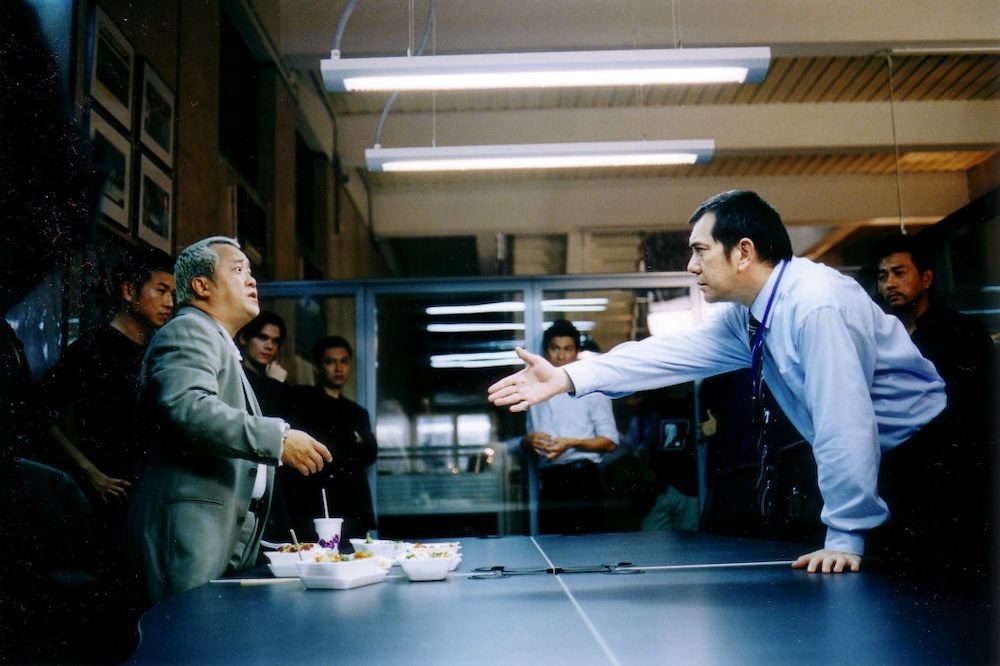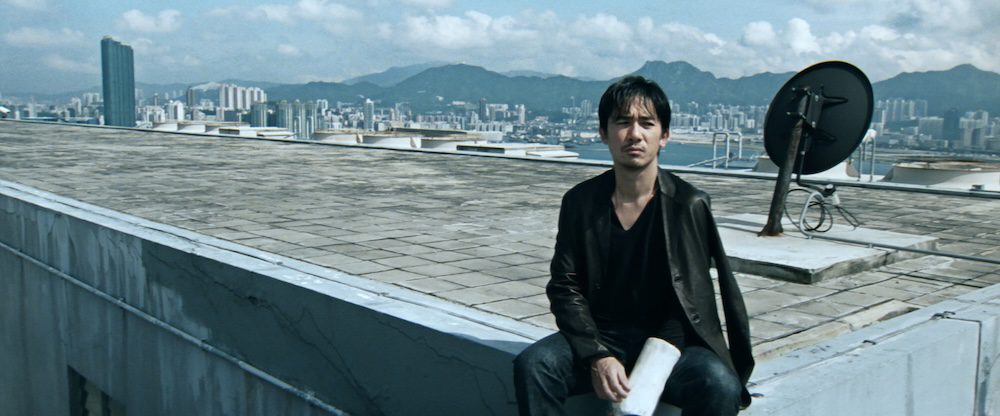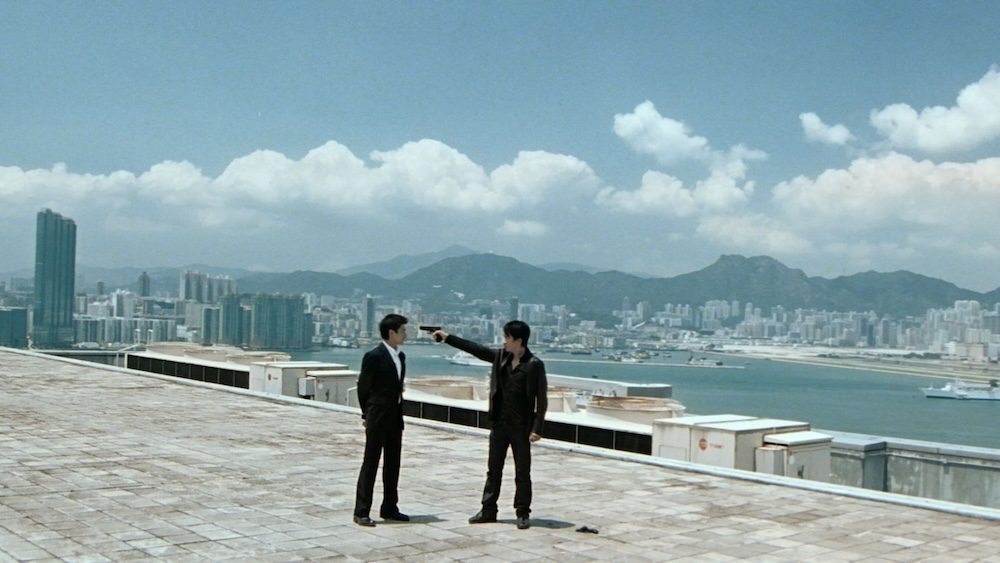
It’s been over 22 years since Infernal Affairs <<无间道>> came out on the silver screen, but I’ve never watched it for a multitude of reasons. Firstly, I had already heard that it was best watched in its original Cantonese language, but the only version available in Singapore was the Mandarin language dub (with the same standard voices you hear in every Mandarin dubbed film). Secondly, it was really overhyped (to me). Thirdly, I kept seeing it being re-enacted everywhere that the whole rooftop scene felt like it would be any annoying joke to me (in my head).
I then attempted to watch it last year with a friend, but the opening wasn’t the most engaging. We stopped right before the first big action scene.
I only recently watched it in its full glory – with Cantonese audio and English subtitles.
I completely understand why the film is as lauded as it is.

Synopsis
Infernal Affairs <<无间道>> is a Cantonese action thriller that is a crime drama. It will be referred to as Infernal Affairs for the rest of the review. It revolves around an undercover police officer who infiltrates a triad, even as a triad member infiltrates the police force. The two moles end up trying to discover each other’s identity, while trying to cling on to their own.
The movie’s title, <<无间道>>, comes from the Continuous Hell in Buddhism, also known as 无间地狱. Taken as a whole, <<无间道>> refers to the unceasing way/path, in reference to the Continuous Hell.
Directors: Andrew Lau & Alan Mak
Writers: Alan Mak & Felix Chong
Cast:
- Andy Lau (Lau Kin-ming)
- Edison Chen (young Lau Kin-ming)
- Tony Leung (Chan Wing-yan)
- Shawn Yue (young Chan Wing-yan)
- Anthony Wong (Superintendent Wong Chi-shing)
- Eric Tsang (Hon Sam)
- Chapman To (“Silly” Keung)
- Gordon Lam (Big B)
- Sammi Cheng (Mary)
- Kelly Chen (Lee Sum-yee)

The sheer sophistication of the plot
The writing for Infernal Affairs just blew me away. The first action scene, where the police and the gangsters are trying to outwit each other using their respective moles, worked on so many levels. The complexity is both easy to follow, yet amazing to behold, as you watch both Lau Kin-ming (Andy Lau) and Chan Wing-yan (Tony Leung) juggle multiple objectives, while still trying to maintain their cover.
The cat-and-mouse game continues with such sophistry throughout the film, as it drops bombshell after bombshell on you. People drop like flies (it’s a crime drama after all), and the twists and turns leave you breathless as you wonder – how will each character navigate this new turn of events?
And that’s the beauty of it. They do – and they don’t. They have well laid plans that unfold, but adapt to each circumstance as it arises. It’s the perfect combination of strategy and dynamism – qualities that both characters possess, which make them such incredible foils for each other.

Tony Leung’s portrayal of a tortured undercover cop
Tony Leung manages to pull off the scruffy look of Chan Wing-yan, stubble and all, without that perfectly manicured hipster pretentiousness that all cinematic facial hair seems to have these days. Granted, this was 2002, and this was also Hong Kong cinema. Through the glistening close-ups and the irate outbursts, there’s this sense of a man who’s living through Hell – ostensibly making the title <<无间道>> about his story.
Yet there’s a sense of determination, a higher… ikigai, if you will, that drives his actions. Whether it’s justice, responsibility, or simple fear – it propels Wing-yan’s journey forward as he attempts to right the wrongs that his role allows him to, even as he finds himself committing deeds that place his own morality in doubt. And it’s this duality, this difference between his external and internal selves, that creates the tortured character that straddles the fine line between genuine suffering and kitschy angst.

The inscrutable look on Andy Lau’s face
But the movie’s title, <<无间道>>, truly belongs to Lau Kin-ming, as evidenced by the final scene of the film. It’s made all the more fascinating by Andy Lau’s enigmatic, near poker-face expressions when he’s in moments of turmoil. What is he thinking? What is he planning next? Do his words truly echo his thoughts?
In contrast to the more expressive portrayal of Chan Wing-yan by Tony Leung, Andy Lau’s more stoic Lau Kin-ming leaves you with food for thought as to his motivations and to the meaning of the movie’s title. The theme is about unceasing torment – but just how much guilt does Lau Kin-ming feel? We may never know (well, not until the sequels anyway).

Tension with tech holds up – two decades later
Many of the action scenes rely on the copious use of phones – in the pre-smartphone era. The tension relies on plain text messaging and ring tones. If you were born after Infernal Affairs was made, you’d be watching the protagonists use relics of a bygone era.
Yet it works. The basic principles behind the technology and tension work. Despite it being something we don’t see today (and possibly something that may not work as well in a modern film), the thrills that come from the information reveals and hidden data still excite. It’s an incredible feat of cinematic magic to be able to have all this hold up, so many years later, to a first-time viewer.

A beautiful ending
Again, having never watched the movie in its entirety before, I didn’t really know how the film would end. I honestly thought it would end the way most Hong Kong crime dramas end (which it does, to an extent).
But it’s a such a poignant ending that brings the story full circle. It carries such irony and weight to it, and raises the question – is it worth getting what you want, when you have to sacrifice everything that is intangible to you? I thought it left no potential for a sequel, but two more instalments were made after this.

Hong Kong cinema at its finest
Infernal Affairs is truly one of the best Cantonese films out there, with the setting (Hong Kong) being such an integral part of the film that it’s virtually a character in its own right. The narrow alleyways, the crowded streets, the grit and grime and dirt, the skyscrapers, the mix of traditional and modern architecture – it’s almost like being in Hong Kong itself.
Not to mention the performances, the quick cuts, the tension, and a story that, truth be told, I can’t imagine taking place elsewhere (although yes, I am aware that there many remakes of Infernal Affairs in other territories).

Should you watch Infernal Affairs?
Of course you should catch it! At the very least, it’s got a gripping plot that will keep you guessing at every turn. Andy Lau and Tony Leung turn in their most iconic performances in this film, even as they wrestle with questions of identity. The cinematography makes this a thriller that stands the test of time. Infernal Affairs has such strong Hong Kong flavour that you can’t help but want to see those locations for yourself.
For me, I only wish I had caught this gem earlier in life.
Score: 9.5/10
Infernal Affairs is available on Netflix.
Leave a Reply